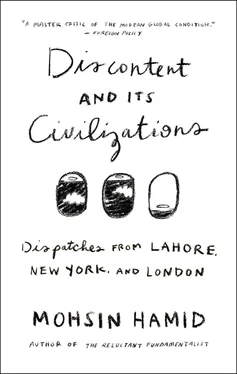Eventually my wife pointed out that my hair really needed attention. So I went for my haircut. I hadn’t seen my barber in years.
“Hot or cold?” he asked me.
“What do you mean?” I said. What the hell was a hot haircut? Or a cold one for that matter?
“Hot or cold?” he repeated, a little surprised.
I realized he was offering me tea or a soft drink. “Neither,” I said, shaking my head. “Sorry, I’ve been away awhile.”
He cut my hair. Then he gave me a scalp massage. Then he gave me a shoulder massage. He was good. I thought of staying longer. I looked at the big glass pane of the window and the cars and motorcycles parked outside. I paid him and left.
I’d had a number of missions since moving to Lahore. I’d had to get us a new fridge and sort out the strange smell coming from one of our bathroom drains and shepherd the cardboard boxes of our belongings through customs at the dry port. But my top priority had been getting broadband. I’d succeeded remarkably easily.
Now when I went online at home, thanks to a 1,999-rupee (roughly $23) monthly contract, I flowed at 2 Mbps through a Pakistan Telecommunications Limited ADSL telephone line, down to Karachi, offshore to the SEA-ME-WE-3, SEA-ME-WE-4, and I-ME-WE, a trio of optical fiber underwater cables that handle the bulk of data moving between South Asia and the Middle East and Europe, and thence to any server or router I needed to access on the planet.
Out in the cyber universe, my Internet persona could continue to live pretty much the same life it had lived when my physical existence was in London or New York. It could visit the same websites, follow the same news, correspond with the same friends and agents and publishers. This pleased me.
I’d been able to watch a streaming high-definition trailer for Avatar before going to see it that night.
When we arrived at the cinema, barricades meant that no one could park outside. We had to leave our car in a vacant plot down the road. A police jeep was stationed near the entrance. Security guards manned a metal detector. Inside, each bathroom had a guard as well. Other than that, it was like going to a modern Hollywood-dependent cinema anywhere. There was sweet and salty popcorn, there were hot dogs and nachos, there were M&M’s and Coke.
The cinema was not configured for 3-D. But the screen was large and the surround-sound system was powerful, so the 2-D experience was still impressive.
The audience cheered as a race of exotically named, technologically disadvantaged, religiously inclined, dark-skinned (well, blue) people fought a marauding, resource-hungry, heavily armed force of seemingly American marines whose leader roared of the need to “fight terror with terror.”
A friend leaned over to me when it was done. “Is James Cameron secretly Pakistani?” he asked.
We stepped outside. Some people smoked cigarettes. Others smoked joints. Then we drove home. I passed an army checkpoint on my way. At an intersection a digital billboard was running a news ticker with the number of deaths from the latest drone attack.
The main character in Avatar is a marine who goes online to inhabit a hybrid body that looks like the dark-skinned enemy. I wanted to get home to go online and explore his fictional universe further. I also wanted to get home because the streets were oddly deserted. A winter fog had descended, making it difficult to see ahead.
(2010)
PASSING THROUGH THE Qatar airport, I thought I glimpsed, on the horizontally scrolling news ticker of a red-liveried news channel that was probably BBC, the information that an American ambassador had been killed. My first thought was, Where? My second, related, was, I hope not in Pakistan.
After reconfirming that my four-month-old son was securely strapped to my chest, I fished out my BlackBerry. Like many online Pakistanis, I have a group of friends I turn to for breaking news, political commentary, and gallows humor. My circle, mostly aged forty or thereabouts, favors the decidedly uncool (to which a chart of RIM’s plummeting share price will, sadly, attest) medium of BlackBerry Messenger — BBM — for this purpose.
Responses to my BBM query were more or less instantaneous. “Not sure you read that right, bud.” “Nope. Nothing on CNN.” And then: “Wait. Ambassador down. Benghazi. Libya.”
Libya. Surprising. I powered off my phone for the flight to Lahore. When I powered it up again, waiting my turn at the X-ray scanners with which customs officers prevent alcohol from being smuggled into Pakistan (the war on booze being approximately as successful in our country as the war on drugs is in the US), there were already several BBM messages suggesting that the ambassador’s killing was related to the film Innocence of Muslims .
The following day, on BBM, Twitter, Facebook, and elsewhere, I came across numerous claims that we would soon see antifilm protests raging across Pakistan; questions about what was wrong with, variously, the Americans, the Libyans, us Pakistanis, Muslims, and the people who run YouTube; and jokes too offensive to too many varied sensibilities to consider reproducing here, although some were, in my admittedly idiosyncratic estimation, really quite good.
I also received more than the usual quantity of chain-SMS messages that day, and — in addition to the standard advertisements for English-language training courses, dengue-thwarting mosquito nets, energy-efficient air conditioners, and pay-by-text Koranic guidance — there were two that caught my eye.
The first read precisely as follows:
ALLAHU AKBAR!!!! The cinema in America that was going to play the film of the Prophet today at noon. An earthquake hit that area that caused the building to split into two pieces. The Americans are so shocked at the miracle, that they didn’t allow full media coverage on the topic and that’s why you didn’t hear about it on the news today! Share this around and let people know that ALLAH is protecting the Prophet!!! PASS THIS MESSAGE ON! Please don’t let this stop at your phone!
The second message called for a Pakistani boycott of Google, claiming (correctly) that Google owned YouTube, and also (correctly) that YouTube hosted video footage of the anti-Islam film, and, further, that Google earned five billion dollars in revenues in Pakistan (surely incorrect, despite the oft-reported statistic that we Pakistanis are among the world leaders in online searches for porn; Google’s total global revenues are in the neighborhood of forty billion) and therefore that a Pakistani boycott would bring Google to its knees.
Whatever the merits of these bottom-up, user-driven responses to the affront, it was soon apparent that neither the Pakistani state nor opportunistic Pakistani fringe politicians, who lurk in the nether region where the plankton mist of perceived persecution meets the vent of ready violence, would allow this moment to be left to the conscience of mere individuals.
The state’s reactions were immediately apparent. YouTube was blocked. The Internet throttled to a crawl. I have three broadband providers for my home, a bit obsessive, admittedly, but even in regular times the reliability of each leaves something to be desired. My cable modem promptly died. No Internet traffic could make its way in or (as far as I could tell) out. My DSL link was barely alive, operating at a speed that brought to mind the “boing boing” sound of an old dial-up connection. My WiMAX setup, normally the least fleet-footed of my three, the backup for my backup, dipped to about a quarter of its promised bandwidth, which, given the circumstances, wasn’t bad. Unfortunately for me and my fellow Pakistani Web surfers, the state’s online response also included, in a scattergun attempt to block specific IP addresses that might link to the film, the erection of a national firewall that denied access to what seemed like half the Web.
Читать дальше












